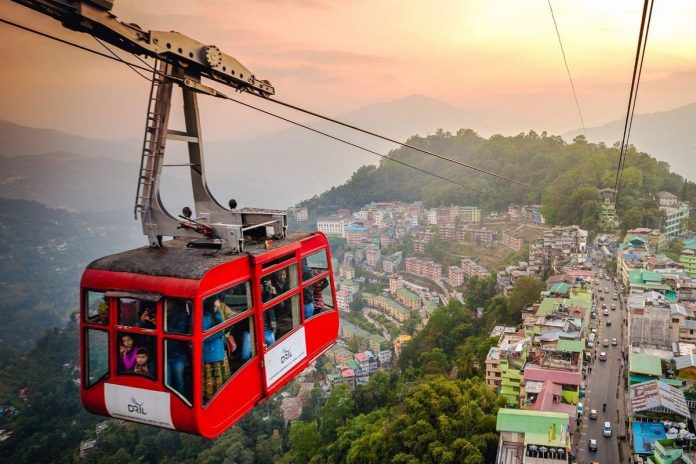Deputy Chief Minister Mukesh Agnihotri unveiled an ambitious plan to address vehicular congestion in the state capital, Shimla, by constructing a 13.55 km ropeway.
Agnihotri disclosed that the New Development Bank (NDB) is a crucial partner, offering 72 per cent grant support and, eight per cent loan, with Himachal government contributing 20 per cent equity.
With all necessary formalities completed, the project is now progressing to the global tender stage.
The Ropeway project
Providing specifics, Agnihotri outlined the ropeway’s features, including 660 trolleys accommodating eight to 10 riders each, and 13 strategically positioned stations along the route which starts from Taradevi.
The trolleys will be available every two minutes, ensuring efficient and timely transportation. Emphasising environmental consciousness, the project aligns with a green and sustainable vision.
The stations, starting from Taradevi and extending to various key locations, include Judicial Complex Chakkar, Tutikandi Parking, New ISBT Tutikandi, Railway Station, Old ISBT Shimla, Lift, Secretariat Chhota Shimla, Nav-Bahar, Sanjauli, IGMC, Ice Skating Rink, and 103 Near Hotel Chetan Par 13.
The entire project is slated for completion in five years, with the first phase targeted within two and a half years.
Shimla, grappling with persistent traffic congestion, particularly in the Taradevi to city centre stretch, is set to benefit from this transformative project.
Known as the ‘Queen of Hill Stations’, Shimla has become a multifunctional city along with the dominance of tourism, administrative and institutional activities. As a result of the increased urbanisation in and around hill cities, Shimla is currently experiencing issues with traffic.
During the peak tourist season, the city witnesses over 10,000 vehicles, while its infrastructure caters to only 2,500 vehicles.
Agnihotri also mentioned another proposed project for a Parwanoo-Shimla ropeway, potentially becoming the world’s longest at 38 km, as per a Hindustan Times report.
Significance of project
Shimla, the capital city of Himachal Pradesh, has a population of about 3.08 lakh with an annual tourist influx of around 40 lakh.
The city has narrow roads with heavy settlement, causing traffic snarls. The problem further compounds during the tourist season when thousands of tourist vehicles reach Shimla daily causing huge traffic jams.
Due to geographical and geo-technical limitations, it is not possible to construct bus rapid transit system (BRTS), monorail, or metro in the city. A ropeway, thus, is the only viable solution to provide urban transport.
The innovative ropeway project would be a game changer with tourists parking their vehicles at the entry point of Shimla and boarding the ropeway network. This eco-friendly mode of transportation will be a carbon neutral project.
Further, the fare charged on this mode of transportation would be more or less at par with the conventional transportation in order to motivate people to travel on this network instead of using their own vehicles.


